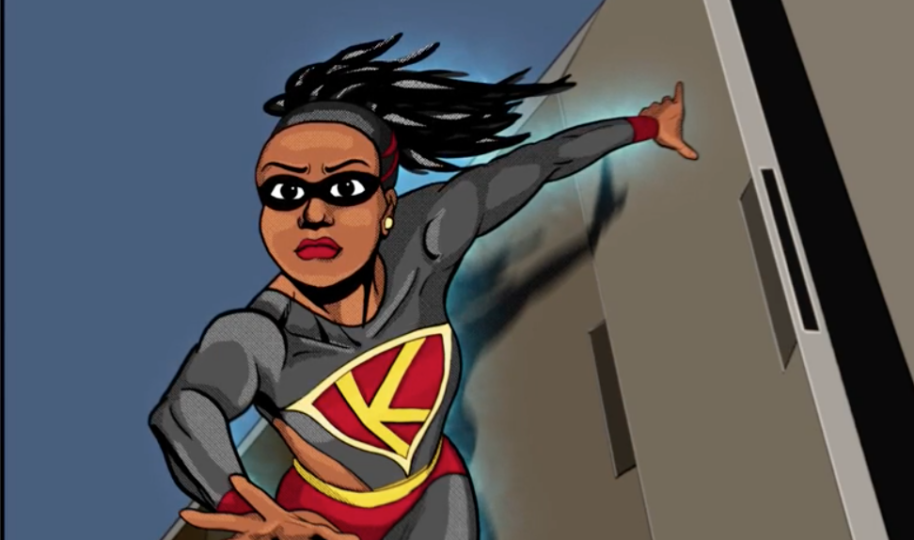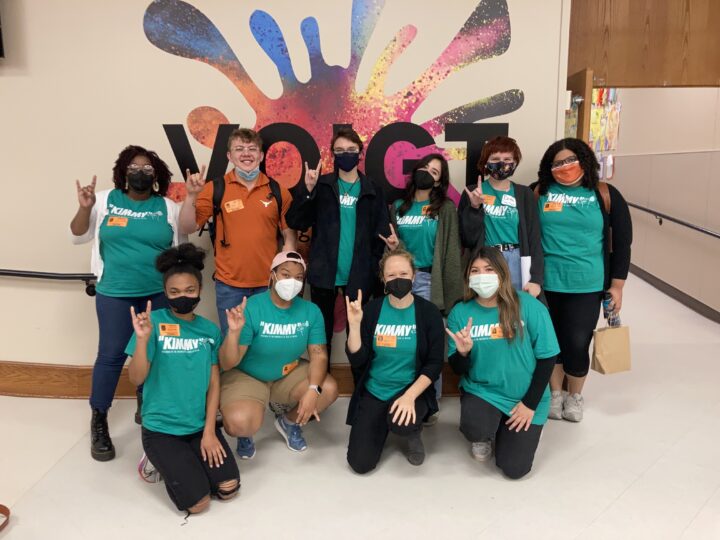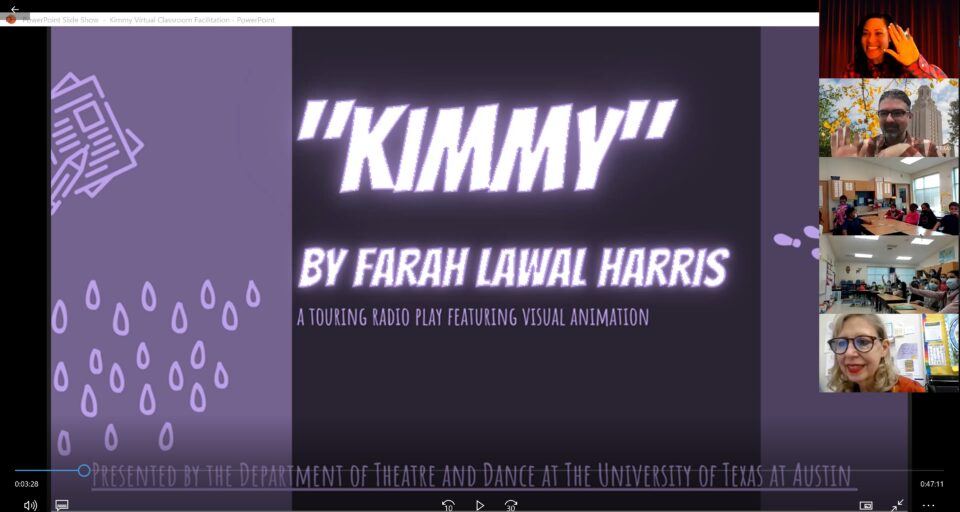Guest blog contributor and director of “Kimmy,” Yunina Barbour-Payne discusses the inspiration behind the superhero story of Kemi, the importance of representation in theatre for young audiences and the hero within all of us. After recently concluding a tour to schools in the Austin area, “Kimmy,” an interactive radio play, returns to the stage at the Oscar G. Brockett Theatre this December.
Why I said yes…
In the shadows of mourning life as we once knew it, imagine a young Black girl with incredible swag who saves us all! When our creative process began for “Kimmy,” an interactive radio play for young audiences, in late July, despite the duress and drudgery of surviving multiple pandemics: COVID 19 and the ongoing unjust murder of Black people, I said yes. As a Black woman living in Texas, my primary motivation for saying yes was this story’s’ central character, Kemi, a Black girl who uses her art to maneuver through it all. Directing “Kimmy” brought about an opportunity to play, dream and escape across time, energy and place.

There is and has always been something special about theatre for young audiences. For me, it is the magic of the “ooos” and “ahhs” when audiences first discover a character on stage has done something extraordinary or perhaps even extra-ordinary. Recently, I led a virtual pre and post show workshop for our touring production of “Kimmy.” When I asked four classrooms of fourth graders, “What comes to mind when [they] see the word hero?” they brought up images of firefighters and on multiple occasion responded with the literal phrase “people who are saving us from COVID-19.” For me, this image recalls a very different kind of hero than the one that would have come to mind when I first became involved with the Theatre for Young Audiences tour of Ramon Esquivel’s The Hero Twins: Blood Race at the Department of Theatre and Dance two years ago.
A Concept Fit for a Hero

So, what does it mean to have a young Black girl everyday hero at the center of a story we bring to young people across Austin? It means a great deal.
A major theme of this piece is the impact of heroes in our everyday lives. This moment of returning to schools and some semblance of “normal” while being very much still in the midst of the pandemic asks us to consider and reimagine the hero figure. As our young touring audiences have noted, heroes are indeed all around us. Through our creative process, we began by taking inspiration from the concept of the “everyday hero” and expanded it to an appreciation for the people in our lives. This theme heavily informed my vision for “Kimmy.” I was inspired by late representative John Lewis’s comic book series March, which depicts the life of the civil rights activist and situates him as an everyday hero. Like Lewis, our story’s main character, Kemi, is a hero in her own right. When talking with playwright Farah Lawal Harris about her inspiration for the radio play, first commissioned by the Kennedy Center (link), she responded that she wrote this piece in response to a prompt explicitly about heroes in the Washington, D.C. area.
With this production, my directorial mission has been to make a radio play relevant to our 2021 conditions in the wake of multiple pandemics (Covid-19, racial injustice), and to create a beautiful piece of theatre for young audiences with a specific cultural aesthetic that would stick, feel relatable and be exciting to witness. As a scholar/artist, my approach to any creative process is constantly informed by my engagement with theorists committed to Black feminist practices. Kemi is a Black girl relying on herself, her hip hop culture and her African diaspora heritage to navigate through life’s hard moments. To me, it only made sense that a Black girl hero figure who was navigating the same pandemics I was might deserve her own comic book. Comic books have often been a space to celebrate heroes, and even more recently, Black super hero figures have been a growing element of American pop culture.
By the time rehearsals began in August, animator Ningmo Liu and sound designer Dillon James had multiple conversations about how to attend to the heroic themes in this piece visually and audibly. Crafting this work with the tenets of Afrofuturism and Comic Books in mind, we framed our story utilizing the technology of the comic book as a way in. Our collaboration on “Kimmy” resulted in a comic book representation of a slice of Kemi’s life with hip hop elements and musical moments narrated by the hero herself. In the rehearsal room, we used our bodies as tools for creating the soundscape for the world of our play. “Kimmy” was a story I needed to remind myself of my own hidden powers of imagination (and as an undercover beat boxer myself). It is my hope that our comic book approach inspires our audiences to consider the moments when they tap into their own hidden hero selves.
KimmyCon
For the past four weeks, this thirty-minute radio play with animation has been presented at schools in the Austin area, featuring the work of alumni and graduate and undergraduate students from the Department of Theatre and Dance and the Department of African and African Diaspora Studies. During the first week in December, we will transition from our “Kimmy” radio play with animation in classroom spaces to an immersive experience in a theatre space; a shift that we’re calling KimmyCon. KimmyCon uses the concept of everyday heroes and expands the fantasy world of Kemi’s life beyond the pages of our virtual comic book and into an immersive space in the Oscar G. Brockett Theatre. This new way of experiencing “Kimmy” invites audiences to an embodied exploration of the themes from this play. In line with Afrofuturist thought, it is my hope that this experience prompts audiences to think about culture alongside pandemic; identity alongside adolescence and present epidemics alongside future possibilities.

Guest written by Yunina Barbour-Payne (Director of “Kimmy”)
“Kimmy”
By Farah Lawal Harris
December 3-4, 2021
Oscar G. Brockett Theatre

